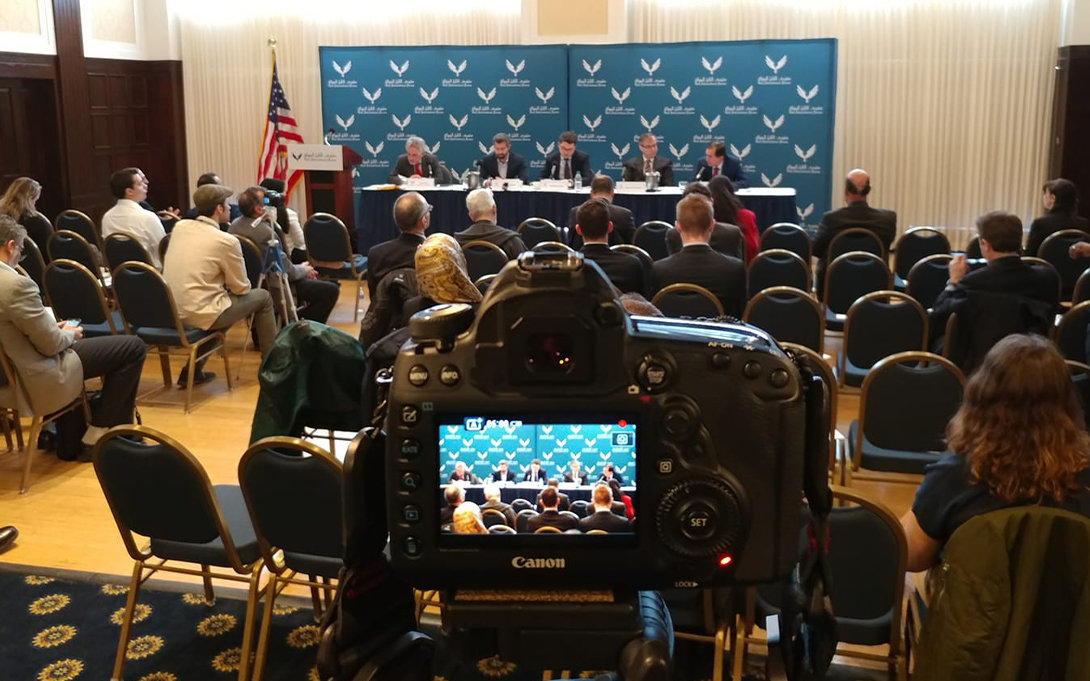
The Persian Gulf region represents one of the most geopolitically and strategically important parts of the world. Among other attributes, the nine Gulf nations hold 55 percent of the world’s oil reserves. However, tensions among and between the countries and the rest of the world have led to decades of war and economic sanctions.
As inaugural Gulf International Forum (GIF) visiting student research fellows this summer, three Ford School students had the opportunity to delve deep into the issues affecting the region, through a collaboration with the Weiser Diplomacy Center (WDC). GIF is a think tank in Washington, DC, which seeks to examine the region in a holistic way and provide policymakers in the U.S. and the region with new research and perspectives. The Ford School students engaged in eight weeks of virtual, intensive, mentored study and analysis in conjunction with Ford School faculty and GIF scholars.
The relationship between WDC and GIF began when Ambassador Patrick Theros, a strategic advisor to GIF, spoke at a WDC event in November 2019 “Conversations Across Difference”event. (Theros was happy to be reintroduced to Ann Arbor, where he was born but has never lived, particularly as generations of his family once owned The Brown Jug!)
The 36-year veteran diplomat, who was ambassador to Qatar and had stints in Saudi Arabia and the UAE, was impressed with the priorities of the WDC and engagement and enthusiasm of its students.
“The Gulf International Forum is always looking for ways to improve our scholarship and academic credentials. It is different from other think tanks because it is oriented to the entire Gulf region, and has funding from multiple sources,” says Theros. “GIF is more independent than other think tanks, many of which are entirely funded by one state or another. Sometimes we upset everybody, so we must be doing something right,” he adds.
One of the visiting student research fellows, Ford School PhD candidate Corina Simonelli, used the GIF opportunity to create data sets about the financing and counter-financing of violent non-state actors that are active in the Gulf region. One set looked at the financial strategies used by all terrorist groups active in the Gulf region from 1990 to 2018. The other aggregated information on the financial counter-terrorism strategies employed by state and intergovernmental actors, giving insight into a state's capacity and political will to follow through with its legal provisions to combat terrorism.
“I think this is an excellent partnership where Ford School students can experience working in a policy environment, connect to Gulf experts, and improve their knowledge and written work on topics relevant to the Gulf,” says Simonelli. “I am sure the Ford School's access to policy experts in the Gulf for seminars, policy talks, and mentorship opportunities will increase beyond this summer program.”
Thamreen Siddiqui, a Ford School MPA candidate, worked on an historical commentary and analysis of the lessons learned from the Gulf Cooperation Council (GCC)-Qatar crisis. Sheridan Cole, the third student fellow and a senior at the Ford School, studied women’s empowerment across the GCC.
“This was a phenomenal experience,” Cole says. “I was able to take eight weeks and intensely research strategies for the inclusion of women in judicial, parliamentary, and cabinet-level positions. While there are differences between the countries, there is an overall public commitment to women in parliament, including quotas in Saudi Arabia and the UAE. One of the reasons is that it seems to be the most looked-at measure by the West, and the governments are aware of the PR value of women in parliament. When you look at women in the judiciary or cabinet, it’s a different story.”
Cole has already produced one commentary which can be seen on the GIF website. Her mentor was GIF’s Executive Director Dania Thafer, PhD.
“Dania gave me guidance and support and made some incredible introductions to people and to other materials I probably wouldn’t have found on my own,” says Cole. “As a woman from the region, she also pointed me to cultural nuances that I wouldn’t have picked up on through purely scholarly research, and explained the political dynamics for women’s networks there,”
For Thafer, the experience was fruitful as well.
“GIF seeks to fill a gap for objective information for policymakers, scholars, and business leaders looking at all nine Gulf countries. Working with the younger scholars has given me new angles, ideas, and insights into the issues, and their research has been eye-opening. In return, I can open new channels for them, through local knowledge and contacts,” she says.
WDC’s collaboration with GIF will also help Ford School students to engage with policy experts on campus. For example, WDC will host GIF experts for a panel discussion this fall on the next phase of U.S. foreign policy in the Middle East. WDC director John Ciorciari says, “This partnership offers a great way for Ford students to learn about, study, and contribute to the policy discourse on a region of obvious enduring importance.”
More news from the Ford School